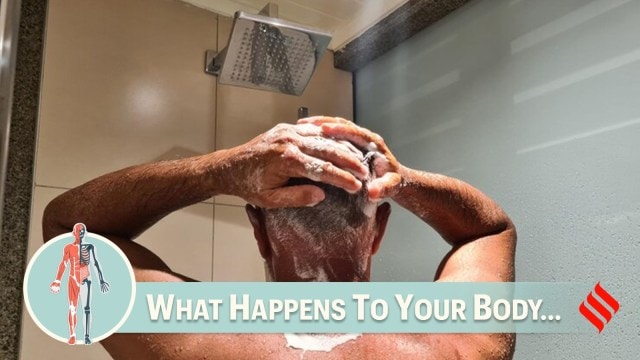📣 For more lifestyle news, click here to join our WhatsApp Channel and also follow us on Instagram
This is what happens to the body when you stop taking a shower
Dr Swetha Sridhar, assistant professor at Bowring and Lady Curzon Hospital, says, “Skipping your daily shower might seem harmless, but your skin will quickly tell a different story.
 Here's what happens when you stop taking a shower for a prolonged period of time (Source: Freepik)
Here's what happens when you stop taking a shower for a prolonged period of time (Source: Freepik)Personal hygiene habits, particularly showering, are deeply ingrained in our society. But have you ever wondered what would happen if you suddenly stopped this daily ritual?
While the idea might seem unpleasant or even taboo to some, understanding the body’s natural processes in the absence of regular bathing can offer intriguing insights into human biology and the complex ecosystem living on our skin.
Dr Swetha Sridhar, assistant professor at Bowring and Lady Curzon Hospital talks about the surprising changes that occur when one steps away from the shower, forgoing regular cleansing routines.
Immediate effects on skin health and hygiene when a person stops showering regularly
Dr Sridhar says, “Skipping your daily shower might seem harmless, but your skin will quickly tell a different story. Our skin is a dynamic ecosystem teeming with natural oils, sweat, and dead skin cells. Regular cleansing helps maintain this balance, but when you stop showering, these substances accumulate.”
Oil and Sweat Buildup: The overproduction of sebum (skin oil) and sweat can clog pores, leading to acne breakouts, blackheads, and an overall greasy or shiny appearance.
Dead Skin Cell Accumulation: Dead skin cells normally shed gradually, but without regular exfoliation through washing, they can build up and make your skin look dull, rough, and flaky.
Disrupted pH Balance: The skin’s natural pH is slightly acidic, which helps protect against harmful bacteria. Not showering can disrupt this balance, making your skin more susceptible to infections and irritation.
Itching and Irritation: The accumulation of sweat, dirt, and dead skin cells can trigger itching and irritation, especially in areas prone to moisture like the armpits and groin.
 The combination of sweat, sebum, and bacteria creates a pungent odour that intensifies over time without washing. (Source: Freepik)
The combination of sweat, sebum, and bacteria creates a pungent odour that intensifies over time without washing. (Source: Freepik)
Impact on the skin microbiome
“Your skin is home to a diverse community of microorganisms, including bacteria, fungi, and viruses. This is your skin microbiome, and it plays a vital role in protecting your skin from pathogens and maintaining overall health,” explains Dr Sridhar.
Regular showering helps regulate the skin microbiome by removing excess oil, sweat, and potentially harmful microbes. When you stop showering, she says that this balance can be disrupted, leading to an overgrowth of certain bacteria or fungi.
An imbalanced microbiome can compromise the skin’s natural defences, making you more susceptible to infections like folliculitis (inflammation of hair follicles) or impetigo (a contagious bacterial skin infection).
Dr Sridhar adds, “For individuals with conditions like eczema, psoriasis, or dermatitis, neglecting hygiene can exacerbate these conditions, leading to increased inflammation, itching, and discomfort.”
Potential long-term effects on body odour and overall hygiene
While body odour is a natural result of bacterial activity on the skin, showering helps minimise it by washing away sweat and odour-causing bacteria. When you stop showering for an extended period, body odour becomes more pronounced.
Stronger Odour: The combination of sweat, sebum, and bacteria creates a pungent odour that intensifies over time without washing.
Social Impact: Persistent body odour can have social consequences, affecting relationships and self-esteem.
Beyond Body Odour: Poor hygiene can also lead to the buildup of dirt and grime on the skin, making you more susceptible to skin infections and other health issues.
Skin Infections: Bacteria and fungi thrive in warm, moist environments. Without regular cleansing, the risk of skin infections like athlete’s foot or yeast infections increases.
Dermatitis Neglecta: In extreme cases, neglecting hygiene can lead to dermatitis neglecta, a condition characterised by thick, scaly plaques of dead skin cells that can be difficult to treat.
Systemic Infections: In rare cases, untreated skin infections can spread to other parts of the body, causing systemic infections that require medical intervention.
Mental Health Impact: Poor hygiene can negatively affect mental health, leading to feelings of embarrassment, shame, and social isolation.
📣 For more lifestyle news, click here to join our WhatsApp Channel and also follow us on Instagram
- 01
- 02
- 03
- 04
- 05



























